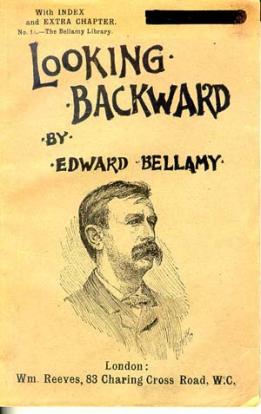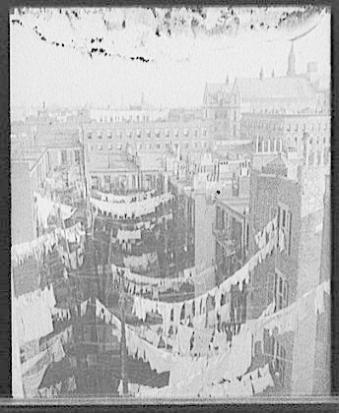
Recently I have found myself more irate than usual about the lack of a living wage for all American workers; to me this is a moral issue that transcends all political posturing. A few weeks ago at my youngest brother’s college graduation Tavis Smiley spoke about the invisibility of the issue in recent political circles… at least until the re-emergence of John Edwards as an Obama endorser. I applauded Smiley’s call for serious attention to the social/political systems that keep so many Americans living lives without any chance for economic security despite hard work and, as commencement speeches are wont to do, Smiley’s focused my attention on what I think is so obvious…the link between education and opportunity.
Yet I sat under a beautiful blue sky that day thinking–again– that this entire relationship hinges on what we mean by "education" and what its goals are. So too does economic success in this country depend heavily on what type of labor you end up engaged in–no matter what your education. Furthermore, all too often happiness and fulfillment (both real and imagined)–not to mention the ability to feed your children!– are dependent upon financial reward for labor. A decade ago I was working as a social worker with people whose lives reflected these contingencies and these are issues I regularly try to raise in my classes. But I have found it difficult in recent years to get my college students to consider that "the system" as they call it is not the ONLY way to conceive of any of these three variables: education, economic security or happiness. And I have found it harder and harder to get them to interrogate the established or presumed relationship between the three. This spring my classroom luck turned when one group of students took up these concerns with a fervor I have not seen in a while. The catalyst? Reading Edward Bellamy’s classic 1888 utopian novel Looking Backward: 2000-1887.
Briefly, Looking Backward is a time-travel utopia in which a young Bostonian, Julian West, emerges from a century-long sleep into the Boston of 2000. This didactic novel–written in the form of many mini lectures by West’s 20th century host, Dr. Leete–offers readers a detailed look at a system of industrial and economic reorganization that eliminates both the excesses
 and desolation of late 19th c. American life by imagining a nationalized economy in which centralization of all economic production and distribution had developed organically over a century from the flawed but promising models of industrial capitalism. While economic concerns are the focus of the work, Bellamy suggests clearly the ways in which this new system requires and thus makes possible a new form of education, new possibilities for economic justice, new ideas about the value of labor and ultimately true happiness for all. The novel was a bestseller in it s day and spurred a political party. But the lesson it offered my students seemed to be to question what appears as given. Here is some of what transpired:
and desolation of late 19th c. American life by imagining a nationalized economy in which centralization of all economic production and distribution had developed organically over a century from the flawed but promising models of industrial capitalism. While economic concerns are the focus of the work, Bellamy suggests clearly the ways in which this new system requires and thus makes possible a new form of education, new possibilities for economic justice, new ideas about the value of labor and ultimately true happiness for all. The novel was a bestseller in it s day and spurred a political party. But the lesson it offered my students seemed to be to question what appears as given. Here is some of what transpired:
The Point of Education:
In Bellamy’s conception of the new world order, the goal of compulsory education is to provide a common ground for all citizens and to provide opportunities for every citizen to identify and cultivate his/her own unique set of skills, talents and affinities–in other words to discern a vocation not just an occupation. Exposure to all major job types during these years helps to ensure that "A man’s," (yes, there is a gendered slant to all of this), "natural endowments, mental and physical determine what he can work at most profitably to the nation and most satisfactorily to himself." Sure, this might stink of determinism to some, but to my students, many of whom are preparing to teach in area public schools someday, reactions tended to be far from such an interpretation. A number of students claimed that that after reading Bellamy they felt that their own lives were somehow less than they could be. They were frustrated with a current notion of education that simultaneously encourages creativity and celebrates "American" ideals of individualism while turning a blind eye to the intrinsic value of different aptitudes, passions etc.
Economic Justice:
This concern was linked very closely both in the novel an in my students’ minds to the way that pairing certain types of labor to certain salaries negated any possibility that young people would find work and make a life that suited them. Dr. Leete goes to great pains to explain to a skeptical Julian West that no one in the year 2000 would choose a profession just because it is perceived to be prestigious or because it commands a high salary. First, everyone in the new Boston is "paid" exactly the same because the ground on which each citizen claims his/her rightful share is merely their "humanity. The basis of [a citizen’s] claim is the fact that he is a man." Second, in Bellamy’s world there is a concerted effort on the part of society’s leaders in to balance out the perceived benefits and liabilities of all occupations (eg. longer hours for less physically demanding position). As a result in Leete’s Boston the possibility that one would be fulfilled in work and in life seemed greatly enhanced.
My students REALLY latched on to this issue. They certainly were skeptical (a good thing) about whether every job could ever actually be understood as equal to every other job. They also challenged Bellamy on his relative dismissal of women altogether. Yet Bellamy’s conception of the relationship between human dignity, labor equality, and access to economic stability struck my students as a profoundly interesting idea. In light of it students raised questions about current American rhetoric that celebrates difference and suggests that all persons have dignity while simultaneously promoting beliefs and policies that seem to determine worth based on the size of one’s paycheck…a measure which, they suggested, was tied back to the idea that not all vocations or skills are seen as equally important. Most telling (and distressing for me) was hearing one student mention aloud that reading this novel made her realize that she might be working toward her degree in Education not because she was passionate about it or because it "fit" her particularly well, but because it was a respected and relatively well-paid profession. This student also pointed out that her "calling" to be a teacher might have more to do with the fact that she knew what teachers do while she was fairly ignorant of many other professions. Here too, Bellamy’s plan made sense to some of my students.
Dignity of Work:
In order to ensure that citizens selected the career they were best suited for AND to ensure that all citizens knew the value of even the most menial forms of labor, Bellamy’s Bostonians all spent their first three years of their work lives in the “industrial army”. During this time they rotated through a series of jobs being exposed to many aspects of the economy and doing work that was necessary but perhaps not wholly desirable as a chosen profession: waiting tables, heavy day labor etc. Sure this system ensured coverage in less desirable industries but what we ended up discussing was the way that this system allowed more time for career exploration and helped make clear the dignity of all work. (Dr. Leete remarks on the latter when he recounts his own turn in this industrial army while being served by a member of the same at a communal dining center).
Although the military-style approach proposed by Bellamy may not strike everyone as a good solution for my students – many of whom are first generation college students–the idea of having few years to experience the world a bit and discern their path without undue pressure seemed to make sense. (During these discussions I was reminded that this is the very thing that students at elite colleges often seem to do). At the same time, the idea of a term of service at the lowest levels of the labor force for ALL Americans struck my students as a powerful leveling device; this was something they saw as going a long way toward making people they identify as "privileged" understand what it is like to do the sorts of jobs (home care attendant, sanitation work, third-shift anything) that are often underpaid or undervalued in our economy.
All of this is to say that for a few short weeks this spring the utopian writing of a 19th century critic of industrial capitalism brought BIG questions about education policy and distribution of wealth to the forefront of a classroom filled with students who to that point had been skeptical at best about the "real world" relevance of what I had been assigning. During our Bellamy classes both those students who celebrated unbridled capitalism and those who believed the same to be the root of all evils (each semester I have at least one such pairing in my classes) were able to talk about their ideas, imagine alternatives (drawn from Bellamy’s detailed prose), and discuss important ideas. The novel set in motion what became a month-long class discussion about current education, economic justice and labor policies at the state and national levels; we saw the phrase "the cultural work of literature" in action. This one book seemed to set my students’ political selves on fire.
So…if I were to address my students (or my brother) as graduates heading off into the "real world" I would remind them to remember the feeling of frustration they felt when reading Bellamy, to remember to ask WHY all labor is not compensated equally, and to remember that Bellamy suggests that a living wage is not a luxury…it is a product of a person’s humanity. Finally, I would encourage them to continue believing that fiction can do important cultural and political work– like making a reader question the status quo! Hooray for literature! Hooray for the lessons learned from Looking Backward.
Note to readers: the issue of gender inequality raised in this novel was explored in my course via a close look at Charlotte Perkins Gilman’s feminist utopian novel with similar themes: Herland.


